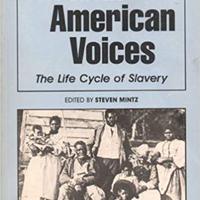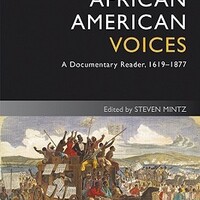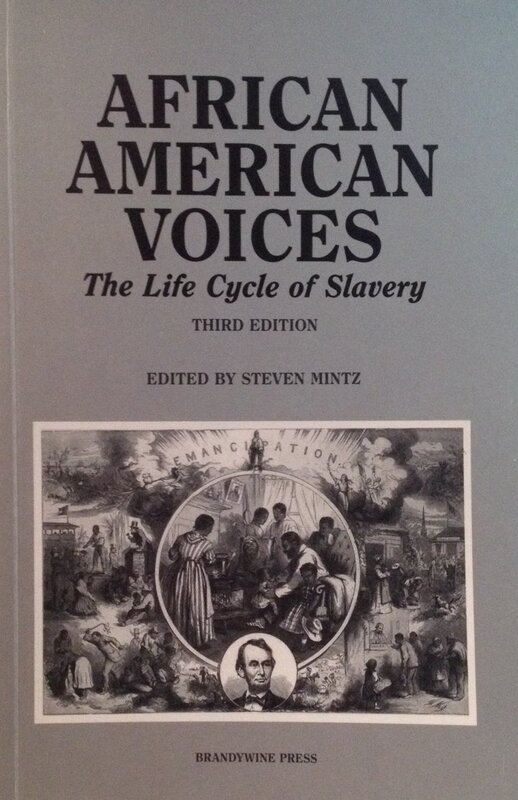African American Voices (ed. Mintz, 3rd ed.)
Item
-
Title
-
African American Voices (ed. Mintz, 3rd ed.)
-
This edition
-
"African American Voices: The Life Cycle of Slavery." Ed. Stephen Mintz. 3rd ed. St. James, NY: Brandywine Press, 2004. xi+233 pp.
-
Other editions, reprints, and translations
-
● "African American Voices: The Life Cycle of Slavery." Ed. Steven Mintz. St. James, NY: Brandywine Press, 1993. ix+178 pp.
-
 African American Voices (ed. Mintz)
African American Voices (ed. Mintz)
-
● "African American Voices: The Life Cycle of Slavery." Ed. Steven Mintz. Rev. ed. St. James, NY: Brandywine Press, 1996. ix+212 pp.
-
● "African American Voices: The Life Cycle of Slavery." Ed. Stephen Mintz. 2nd ed. St. James, NY: Brandywine Press, 1999. xi+227 pp.
-
 African American Voices (ed. Mintz, 2nd ed.)
African American Voices (ed. Mintz, 2nd ed.)
-
● "African American Voices: A Documentary Reader, 1619-1877." Ed. Stephen Mintz. 4th ed. Malden, MA: Wiley-Blackwell, 2009. xiv+241 pp.
-
 African American Voices (ed. Mintz, 4th ed.)
African American Voices (ed. Mintz, 4th ed.)
-
Table of contents
-
(3rd ed. 2004):
Preface (ix)
Foreword (xi)
● Steven Mintz / Introduction: A History of Slavery (1-40)
``Death's Gwineter Lay His Cold Icy Hands on Me'': Enslavement (41-42):
● A European slave trader, John Barbot, describes the African slave trade (1682) (43-45)
● A Muslim merchant, Ayabah Suleiman Diallo, recalls his capture and enslavement (1733) (46-48)
● An employee for Britain's Royal African Company describes the workings of the slave trade (1738) (49-50)
● Olaudah Equiano, an eleven-year-old Ibo from Nigeria remembers his kidnapping into slavery (1789) (51-52)
● A Scottish explorer offers a graphic account of the African slave trade (1797) (53)
● Venture Smith relates the story of his kidnapping at the age of six (1798) (54-58)
``God's A-Gwineter Trouble de Water'': The Middle Passage
(59-60):
● A European sailor, James Bardot, Jr., describes a shipboard revolt by enslaved Africans (1700) (61-63)
● An English captain, William Snelgrave, describes the precautions that slavers must take in order to prevent shipboard rebellions (1721) (64-66) [omitted in 4th ed.]
● Olaudah Equiano describes the horrors of the Middle Passage (1789) (67-69)
● A doctor, Alexander Falconbridge, describes conditions on an English slaver (1788) (70-76)
``Weary Traveler'': Arrival in the New World (77-78):
● Olaudah Equiano describes his arrival in the New World (1789) (79)
● An English physician, Alexander Falconbridge, describes the treatment of newly-arrived slaves in the West Indies (1788) (80-82)
``A Change Is Gonna Come'': Slavery in the Era of the American Revolution (83-84):
● Massachusetts slaves petition for freedom (1774) (85)
● Virginia's Royal Governor promises freedom to slaves who join the British army (1775) (86-87)
● Virginia's assembly denounces Lord Dunmore's proclamation (1775) (88)
● Connecticut slaves petition for freedom (1779) (89-90)
● Boston King, a black loyalist, seeks freedom behind British lines (1798) (91-92)
● A participant in Gabriel's Rebellion explains why he took part in the attempted insurrection (1812) (93)
● Gabriel's brother explains the rebellion's objectives (1800) (94)
● President Thomas Jefferson tries to arrange for the deportation of men involved in Gabriel's Rebellion (1802) (95-96)
``We Raise de Wheat, Dey Gib Us de Corn'': Conditions of Life (97-98):
● Solomon Northrup describes the working conditions of slaves on a Louisiana cotton plantation (1853) (99)
● Charles Ball compares working conditions on tobacco and cotton plantations (1858) (100-02)
● Josiah Henson describes slave housing, diet, and clothing (1877) (103)
● Francis Henderson describes living conditions under slavery (1856) (104-05)
● Jacob Stroyer recalls the material conditions of slave life (1898) (106)
● James Martin remembers a slave auction (1937) (107-08)
``Like a Motherless Child'': Childhood (109-10):
● Jacob Stroyer recalls the formative experiences of his childhood (1898) (111-12)
● James W. C. Pennington analyzes the impact of slavery upon childhood (1849) (113-14)
● Lunsford Lane describes the moment when he first recognized the meaning of slavery (1842) (115-16)
``Nobody Knows de Trouble I See'': Family (117-18):
● Laura Spicer learns that her husband, who had been sold away, has taken another wife (1869) (119)
● An overseer attempts to rape Josiah Henson's mother (1877) (120-22)
● Lewis Clarke discusses the impact of slavery on family life (1846) (123-24)
``Go Home to My Lord and Be Free'': Religion (125-26):
● Olaudah Equiano describes West African religious beliefs and practices (1789) (127-29)
● Charles Ball remembers a slave funeral, which incorporated traditional African customs (1837) (130)
● Peter Randolph describes the religious gatherings slaves held outside of their masters supervision (1893) (130-32)
● Henry Bibb discusses ``conjuration'' (1849) (133-36)
``Oppressed So Hard They Could Not Stand'': Punishment (137-38):
● Frederick Douglass describes the circumstances that prompted masters to whip slaves (1845) (139)
● John Brown has bells and horns fastened on his head (1855) (140)
● William Wells Brown is tied up in a smokehouse (1847) (141)
● Moses Roper is punished for attempting to run away (1837) (142-43)
● Lewis Clarke describes the implements his mistress used to beat him (1846) (144)
``Let My People Go'': Resistance (145-46):
● Frederick Douglass resists a slave breaker (1845) (147-51)
● Nat Turner describes his revolt against slavery (1831) (152-56)
``Follow the Drinkin' Gourd'': Flight (157-58):
● Margaret Ward follows the North Star to freedom (1879) (159-61)
● Frederick Douglass borrows a sailor's papers to escape slavery (1855, 1895) (162-63)
● Harriet Tubman sneaks into the South to free slaves (1863, 1865) (164-66)
● Henry ``Box'' Brown escapes slavery in a sealed box (1872) (167-68)
● Margaret Garner kills her daughter rather than see her returned to slavery (1876) (169-72)
``The Walls Come Tumblin' Down'': Emancipation (173-74):
● Hannah Johnson pleads with President Abraham Lincoln not to rescind the Emancipation Proclamation (1863) (175-76)
● Private Thomas Long assesses the meaning of black military service during the Civil War (1870) (177)
● Corporal Jackson Cherry appeals for equal opportunity for former slaves (1865) (178)
● Jourdan Anderson declines his former master's invitation to return to his plantation (1865) (178-79)
● Major General Rufus Saxon assesses the freedmen's aspirations (1866) (180-81)
● Colonel Samuel Thomas describes the attitudes of ex-Confederates toward the freedmen (1865) (182)
● Francis L. Cardozo asks for land for the freedmen (1868) (183)
● The Reverend Elias Hill is attacked by the Ku Klux Klan (1872) (184-85)
● Henry Blake describes sharecropping (1937) (186)
● Frederick Douglass assesses the condition of the freedmen in 1880 (187-88)
Bibliographical Essay (189-94)
Bibliography (195ff.)
-
Publisher's description
-
● "The 58 selections in this volume cover the history of slavery in America, moving from memories of growing up in Africa to the trials of the Middle Passage, the horrors of the auction block, the sustaining forces of family and religions, acts of resistance, and the meaning of the Civil War and emancipation, presenting 300 years in the collective life cycle of an enslaved people. Mintz's extensive introduction is followed by substantial excerpts from published slave narratives, interviews with former slaves, and letters written by enslaved African Americans. The end of the volume includes a bibliographic essay and a 40-page bibliography, making this an indispensable book for the study of slavery" (publisher's description).
-
Item Number
-
A0480d
 African American Voices (ed. Mintz)
African American Voices (ed. Mintz)
 African American Voices (ed. Mintz, 2nd ed.)
African American Voices (ed. Mintz, 2nd ed.)
 African American Voices (ed. Mintz, 4th ed.)
African American Voices (ed. Mintz, 4th ed.)
 African American Voices (ed. Mintz, 2nd ed.)
African American Voices (ed. Mintz, 2nd ed.) African American Voices (ed. Mintz, 4th ed.)
African American Voices (ed. Mintz, 4th ed.) African American Voices (ed. Mintz)
African American Voices (ed. Mintz)
